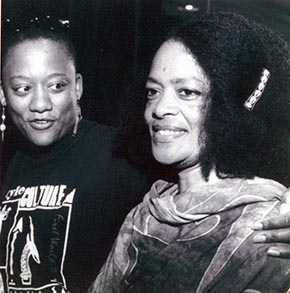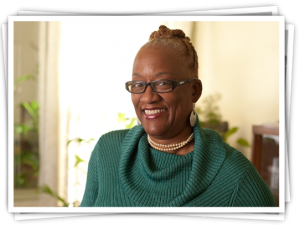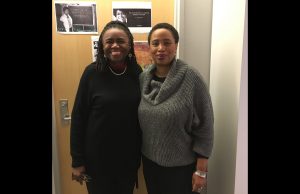Personal is Political: Permission
By Guest Contributor on November 24, 2014By Tina Morton
It was a warm day in May 1994; the third annual Philadelphia Festival of World Cinema was about to begin, and the city was buzzing. I was late arriving to a moderated film discussion.
Here comes one of the filmmakers now.
These are the words I heard Toni Cade Bambara say as I entered a crowded coffee house in Philly. I quickly turned around, anxious to see the filmmaker coming in behind me. No one was there. Oh, was that me she was referring to? I thought with my one eyebrow raised. I smiled at her she winked at me. See, that’s the thing with Toni; she could recognize who you were long before you realized it.
I was formally an x-ray technician at a large center city trauma center. I had the idea that I wanted to make a little film, so someone told me about Louis Massiah’s Scribe Video Center. That is where I met Toni Cade Bambara. She was conducting a scriptwriting class. It was such a safe space to explore and learn. In that class, Aishah Shahidah Simmons was working on what ultimately became the groundbreaking film, NO! The Rape Documentary. I remember giving Toni two short sentences of an idea I had for a film. She gave me three pages of feedback and ideas to implement that vague vision. The result was the film Severed Souls about Corrine Sykes, the first African-American woman legally executed in Pennsylvania. Toni never saw the film, but she was so vital to its completion.
“Severed Souls” ©2001
When Toni became ill, the Image Weavers (A Black & Brown Women’s Film Collective) got together with raw chef extraordinaire Zakiyyah Ali to prepare her meals. Nadine Patterson, Zakiyyah, and I would bring Toni her dinner. We would spend hours listening and laughing at Toni’s stories and adventures. It occurred to me one day that while we are scarfing all this delicious food, Toni was not eating. I think she really just enjoyed the laughter and the love.
So fast-forward 20 years later. I quit my job as an x-ray tech, went to graduate school for film, and I am now an Associate Professor in the School of Communications at Howard University. This happened because Toni Cade Bambara gave me permission to be what I could not even imagine myself to be…a filmmaker.
I love you, Toni. I thank you, and I miss you.
“If You Call Them” ©2002
Tina Morton is a media activist, video oral historian, Associate Professor at Howard University, and 2010 Pew Fellowship in The Arts recipient. Deeply committed to facilitating members of community groups in telling their own stories, Tina has taught various organizations how to use media for social activism. In 2010 in Dakar, Senegal she taught young women and men how to use video for social change with the Young Women’s Knowledge and Leadership Institute. Tina’s personal work, done under If The Creek Don’t Rise Productions, focuses on oral community and family histories. Her award-winning documentary Severed Souls chronicles community memory of the execution of Corrine Sykes, a 20-year-old North Philadelphia resident wrongly executed for murder and the first African American woman to be legally executed in PA. Tina has been a video facilitator for the Precious Places community history projects sponsored by the Scribe Video Center She, and has facilitated the making of The Taking of South Central …Philadelphia, a documentary focusing on problems of gentrification. Nature and Neighbors in Harmony documents the history of Philadelphia’s first planned integrated community.
You may also like...
2 Comments
All Content ©2016 The Feminist Wire All Rights Reserved






Pingback: Image Weavers: In Honor of the Spirit of Toni Cade Bambara - The Feminist Wire | The Feminist Wire
Pingback: Feminists We Love: Linda Janet Holmes [VIDEO] - The Feminist Wire | The Feminist Wire